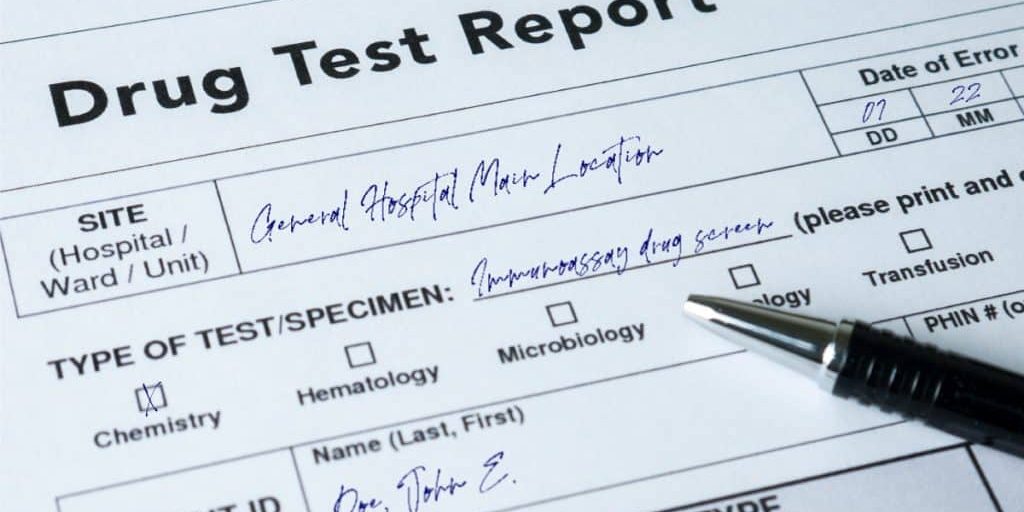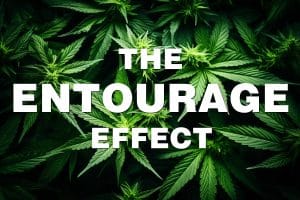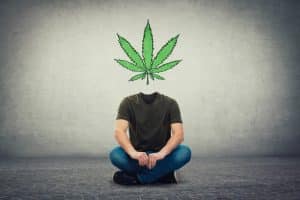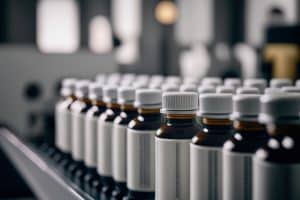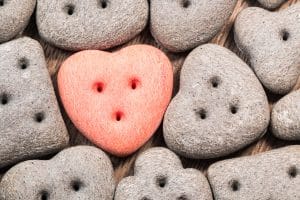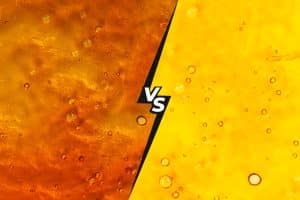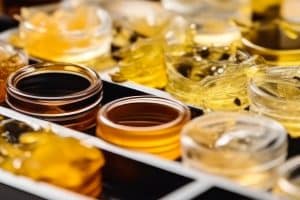Will CBD Show Up On a Drug Test?
Drug tests only look for illicit substances. CBD is non-psychoactive and 100% legal in the USA. So taking CBD alone cannot cause you to fail a drug test because drug screenings do not look for it. It’s a smart question nonetheless because THC and Cannabidiol — the active ingredient in CBD products — come from the same plant.
You’ll need first to understand the difference between the two classes of CBD to know how they produce such different results. One class is derived from marijuana and the other from industrial hemp. Marijuana-derived CBD has lots of THC, whereas hemp-derived CBD has only trace amounts. Let’s briefly examine how the two main classes of CBD differ.
The Two Classes of CBD Cannabis Products
Cannabis is an umbrella term that can refer to either marijuana or hemp. The two classes of cannabis have similarities as members of the same plant species, and they even look somewhat alike. But that is where the resemblances end.
Marijuana CBD
Everyone knows marijuana gets you high. CBD products derived from marijuana are psychoactive too, with enough THC to get you high in a single dose.
The most common way to take marijuana-derived CBD is in a THC:CBD ratio product. The ratio of CBD vs. THC accounts for the difference in effect a dose produces. For example, CBD oil with the same amount of CBD and THC has a 1:1 ratio. The most popular CBD to THC ratios are 3:1 and 5:1. The more CBD a formula has compared to THC, the less psychoactive it will be, and the less high you will get from taking a single dose.
Dispensaries in states where marijuana is legal can sell the product for medicinal and recreational use. However, federal law generally considers marijuana CBD products illegal. In addition, state laws that regulate them can make it illegal to possess them. Further restrictions can make it a violation to transport marijuana into states that do not allow products containing THC.
RELATED: Is CBD Legal in My State?
The bottom line is you have an almost 100% chance of testing positive for THC on a drug test if you’ve taken a marijuana product with more than 0.3% THC in the last 30 days.
Hemp CBD
CBD derived from industrial hemp is available over the counter. All 50 states recognize hemp-based CBD products as legal and federally regulated under the 2018 Farm Bill. Hemp-derived CBD products are even legal in states that consider marijuana illegal. States usually follow the U.S. federal guidelines on regulation and legality.
You cannot get high from hemp-based CBD because it has only minuscule amounts of THC. Federal regulations require the dry weight for industrial hemp contain less than 0.3% THC, thus preventing any psychoactive effects. However, these products may or may not show up on a drug test, depending on how much detectable THC they contain. Taking any hemp-derived CBD product with detectable levels of THC increases your chances of testing positive on a drug test.
But not all hemp-derived CBD products are created equal! There are several ways to extract CBD from industrial hemp and purify it to remove only the THC. CBD products with no THC include Broad Spectrum CBD (0.0% THC) or CBD Oil Isolate (0.00% THC). Full spectrum CBD, on the other hand, will always contain up to 0.3% THC and may be a cause for concern if you have a drug test coming up.
How the CBD Extraction Process Can Affect Drug Test Results
CBD products in the U.S. come in three main types: Full spectrum, broad spectrum, and isolate.
Full Spectrum CBD Oil offers the richest and most robust cannabinoid profile to promote maximum entourage benefits. It’s loaded with minor cannabinoids like CBN, CBG, CBC, and, of course, THC. But don’t worry — the amounts of THC are legally compliant (less than 0.3% THC) and so small that you will never get high, even if you take a hefty CBD dose regularly. You may, however, test positive on a drug screening, especially if you take more than the average daily dose of 25 mg to 50 mg CBD.
Broad Spectrum CBD Oil is virtually identical to full spectrum except for one key difference. There are no detectable levels of THC in broad spectrum extracts (0.0% THC). Therefore, theoretically, you should not fail your drug test if the CBD product you are taking has no detectable levels of THC.
CBD Isolate Oil should do the trick if you want to avoid any chance of failing a drug test. It’s the purest form of CBD, with less than 0.00% THC. Isolate CBD products contain single-molecule CBD separated from all other cannabinoids, including THC. But you should note that CBD works best when combined with other cannabinoids to promote a natural phenomenon called the entourage effect. That’s the advantage of full spectrum and broad spectrum CBD extracts.
Will full spectrum CBD show up on a drug test?
You have about a 50/50 chance of passing a THC drug test if you take full spectrum CBD, according to a small study published in JAMA Psychiatry in 2021. The study evaluated 14 participants exclusively using full spectrum CBD with 0.02% THC by weight. Participants used 1 mL of 9.97 mg/mL full spectrum CBD three times daily. After four weeks, seven out of the 14 participants tested positive for THC on a urinalysis immunoassay, the standard method for rapid drug testing.
Some CBD products may also have more THC than is stated on the label. This discrepancy is more widespread than you might think, so you must check the Certificate of Analysis (COA) for the product you are using to make sure. The COA for your full spectrum CBD product must show less than 0.3% THC, or it is a marijuana product and will increase your chances of testing positive on a drug screen.
Cannabiva CBD products are triple tested throughout the manufacturing process to ensure they meet or exceed federal hemp guidelines. Need to find the COA for a Cannabiva product you are taking? Scan the Q.R. code printed on the bottle label with your mobile device to view its most recent COA. Alternatively, you may visit the Cannabiva lab test portal page to select your product from a list of all Cannabiva products.
Will broad spectrum CBD show up on a drug test?
CBD products with no detectable THC levels should theoretically not cause you to test positive on a drug test. The COA for your CBD product must either show N.D. (not detected) or a percentage of THC less than 0.0% to be considered broad spectrum CBD.
The thought is that if Gas Chromatography-Mass Spectrometry (GC-MS) cannot detect appreciable amounts of THC in lab tests, then it should not be able to detect them in GC-MS immunoassays of urine or blood tests either. However, more research is needed before we can conclusively say that broad spectrum CBD will not cause a positive result on a drug test.
Will pure CBD isolate show up on a drug test?
Isolate CBD products do not have any detectable THC levels and should theoretically not cause you to test positive on a drug test. The COA for your CBD product must either show N.D. (not detected) or a percentage of THC that is less than 0.00% to be considered CBD isolate.
The thought is that if Gas Chromatography-Mass Spectrometry (GC-MS) cannot detect appreciable amounts of THC in lab tests, then it should not be able to detect them in GC-MS immunoassays of urine or blood tests either. However, more research is needed before we can conclusively say that CBD isolate products will not cause a positive result on a drug test.
How to make sure your CBD has no THC
You should always check your CBD product’s Certificate of Analysis (COA) to see how much THC was detected in lab tests. The COA for your CBD product must either show N.D. (not detected) or a percentage of THC that is less than 0.0% to 0.00%.
All Cannabiva CBD products are triple tested throughout the manufacturing process to ensure they meet or exceed federal hemp guidelines. Find the most recent COA for the Cannabiva product you are taking by scanning the Q.R. code printed on the bottle label with your mobile device. Or, visit the Cannabiva lab test portal page to select your product from a list of all Cannabiva products.
Other Cannabinoids and Drug Tests
Full spectrum CBD products may sometimes contain other psychoactive cannabinoids that have similar effects to THC, including Delta-8 THC, a slightly less psychoactive version of Delta-9 THC.
Will Delta-9 show up on a drug test?
Delta-9 is the primary type of THC that can get you “high” or “stoned.” All drug screenings look for it. You have an almost 100% chance of testing positive for THC on a drug test if you have taken a marijuana product with more than 0.3% THC in the last 30 days.
Variations in drug testing sensitivity for THC can allow even a tiny amount to have the potential to produce a positive result. For example, full spectrum CBD oil may contain enough THC that a test can detect, and you have about a 50/50 chance of failing your drug screening, according to a small study published in JAMA Psychiatry 2021. Researchers evaluated 14 participants taking full spectrum CBD for four weeks, and seven tested positive on a urinalysis immunoassay.
Will Delta-8 THC show up on a drug test?
Delta-8 is the slightly less psychoactive chemical cousin of Delta-9. Both have the same properties, but a different arrangement of the atoms makes Delta-8 less potent.
Many states consider the two compounds to be the same because they are psychoactive, and both can get you high. Some tests cannot distinguish Delta-8 THC from its more potent relative, making it likely to appear as THC in a drug screening. You should assume that Delta-8 will cause you to fail a drug test if your product contains more than 0.3% Delta-8 by volume.
Will a product with a THC:CBD ratio show up on a drug test?
Some CBD products available at dispensaries in states where marijuana has been legalized may contain a high amount of THC. The levels of THC to CBD are often depicted with a THC:CBD ratio such as 1:1 or 2:1.
This ratio provides an indication the amount of THC versus CBD.
Most THC:CBD ratio products contain levels of THC that are detectable on standard drug tests and will therefore show a positive result for THC use.
How long will THC stay in your system?
There is conflicting information about detection windows for THC and even whether it’s detectable at all because it is present in such minuscule amounts when it comes to CBD. The truth is, there are many factors at play that could affect the results of your drug screening:
- How much CBD do you take
Your full spectrum CBD concentration and dosage range is an important consideration. Stronger CBD will have more THC and Delta-8. - Your CBD dosage frequency
Using CBD more often increases the amount of THC and Delta-8 you take. - Diet and metabolism
Taking your CBD with meals will slow down and increase absorption of all CBD oil cannabinoids, including THC and Delta-8. Fasting causes much more rapid breakdown and lower absorption rates. - Body weight and body fat composition
Heavier set users must take higher CBD dosages and will potentially store more THC and Delta-8 metabolites in body fat. The more metabolites stored in body fat, the longer the time required to remove them from the body. - Individual tolerance to CBD
The tone of your Endocannabinoid System (ECS) varies from that of others. Some users must take higher doses due to a higher tolerance to CBD. Taking more full spectrum CBD will increase the amount of THC and Delta-8 you take.
If you are concerned about passing a drug test, you should avoid taking any CBD product with detectable THC levels for the next 30 days.
Will Cannabigerol (CBG) or Cannabinol (CBN) show up on a drug test?
Drug tests only look for illicit substances. Neither CBG nor CBN are psychoactive, and both are 100% legal in the USA.
There is some concern that CBN may cause a false positive on a drug test because it has a similar chemical structure to THC. However, no clinical study data backs that assumption as of this writing.
CBD and Military Drug Tests
The Department of Defense imposes stringent drug testing guidelines on military service members. The current posture requires, as of 2023, every branch of service to ban the use of any CBD products. The restriction applies to active duty military and currently serving Guard or Reserve members.
Per the Army’s policy, as defined in 7 USC. 1639o, “the use of products made or derived from hemp… regardless of the product’s THC concentration, claimed or actual, and regardless of whether such product may lawfully be bought, sold and used under the law applicable to civilians, is prohibited.”
Military service members should err on the side of caution and avoid using any hemp or hemp extract products that contain cannabinoids to prevent a positive drug test result.
How long should I stop taking CBD oil to be sure it doesn’t show up on a drug test?
CBD is not psychoactive and is 100% legal in the USA. Drug tests only look for illicit substances, so taking CBD alone cannot cause you to fail a drug test because drug screenings do not look for it.
Generally, CBD remains detectable in your system for up to 30 days after your last dose. However, the actual length of time CBD stays in your system can vary based on many factors that include how much you take, your diet, metabolism, body weight, dosage frequency, individual tolerance level, as well as how you take your CBD (e.g., sublingual ingestion, oral ingestion, topical application, or vaping).
RELATED: How long does CBD stay in your system?
You should know that full Spectrum CBD products have up to 0.3% THC, which may be a cause for concern if you have an upcoming drug test. THC can remain detectable in your system for up to 30 days after your last dose.
Summary: CBD and Drug Tests
Marijuana and hemp products come from the cannabis plant but do not contain the same amount of THC. Marijuana-derived CBD has lots of THC, whereas hemp-derived CBD has only trace amounts (less than 0.3% THC). The key to avoiding detection that may affect your employment or livelihood is to know the variables that could cause a positive result on a drug test.
Not all hemp extracts are created equal. CBD products with no THC include Broad Spectrum CBD (0.0% THC) or CBD Oil Isolate (0.00% THC). These should theoretically not cause you to test positive on a drug test because they have no detectable THC levels. Full spectrum CBD, on the other hand, will have up to 0.3% THC and may be a cause for concern if you have a drug test coming up. Some CBD products might also have more THC than is stated on the label, so you should always check the Certificate of Analysis (COA) for the product you are using to make sure.
Variations in drug testing sensitivity for THC can allow even a very small amount to produce a positive drug test result. Full spectrum CBD oil may contain enough THC that a test can detect, and you have about a 50/50 chance of failing your drug screening, according to one small study published in JAMA Psychiatry 2021.
Drug screening results can never be guaranteed if you are taking any cannabis-derived product due to various complex factors, including the sensitivity of your drug screening, the testing method used, and concentration cutoff limits. Always conduct a risk/benefit analysis with your primary healthcare provider if you wish to take CBD and must also take regular drug tests.
Your body requires up to 30 days to remove THC metabolites from your system. You should not use CBD for at least 30 days if you are concerned about an upcoming drug test.



